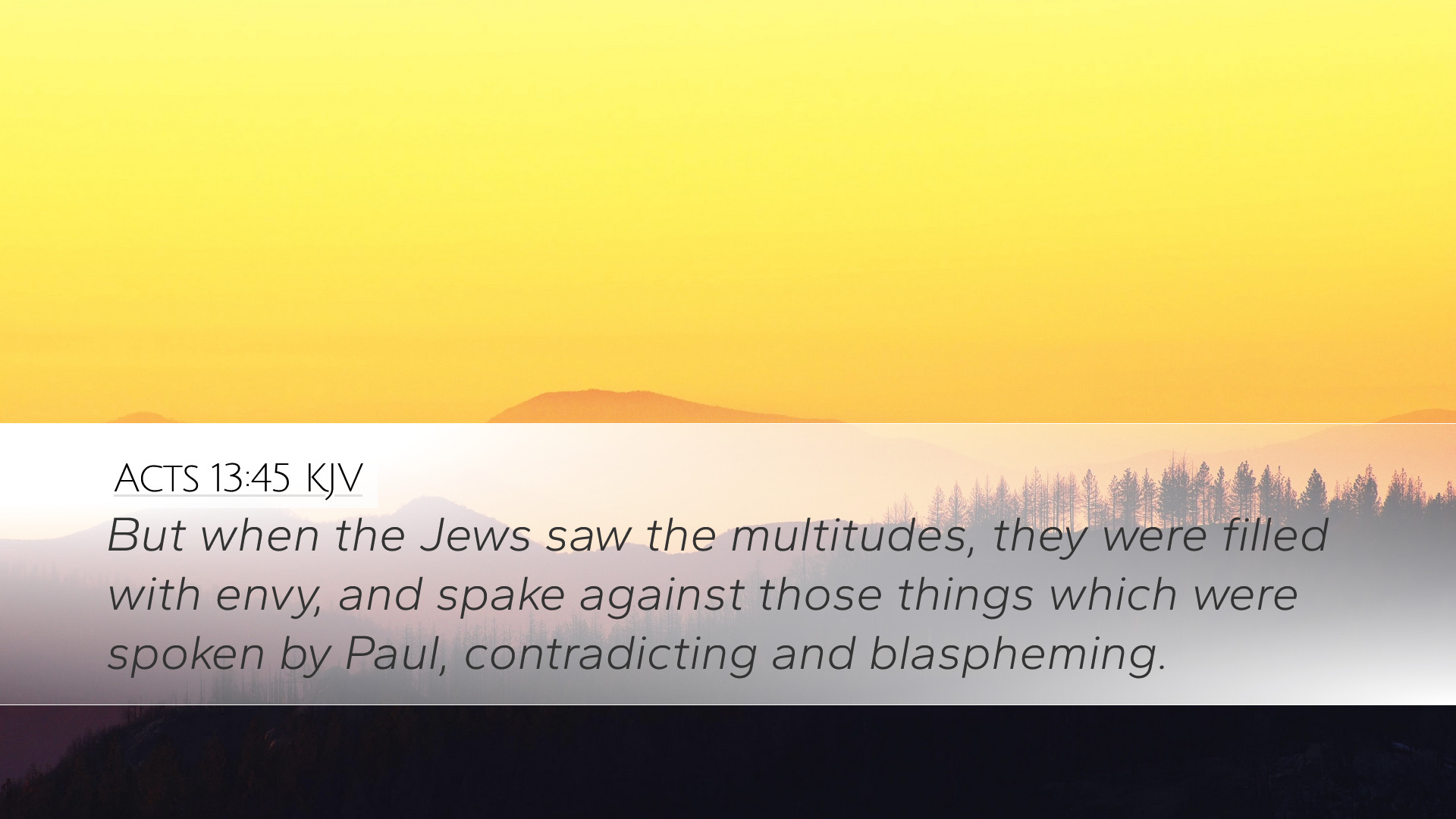Commentary on Acts 13:45
Verse Text: "But when the Jews saw the multitudes, they were filled with envy, and spake against those things which were spoken by Paul, contradicting and blaspheming."
Introduction
The verse in question reflects a significant moment in the early Christian ministry as Paul and Barnabas were preaching to the Gentiles. This passage encapsulates the tension that arose between the Jewish leaders and the apostles, which is pivotal to understanding the broader narrative of the early Church's development.
Historical Context
This incident occurs in the city of Antioch in Pisidia, a place where Paul and Barnabas had a substantial outreach. They initially preached in the synagogue, garnering interest among both Jews and Gentiles. However, the growing influence of their message began to stir jealousy and resistance among the Jewish leaders.
Commentary Insights
Matthew Henry's Commentary
Matthew Henry notes that the jealousy of the Jewish leaders indicates a deep-seated problem: "Their envy was not mere displeasure at the success of others, but rather a reflection of their own spiritual inadequacies." He emphasizes that their reaction was not merely one of discontent but stemmed from the realization that they were losing their hold over the people. This verse illustrates the often adversarial nature of religious competition, particularly when a new message challenges existing beliefs.
Albert Barnes' Commentary
Albert Barnes adds that the Jews' envy is emblematic of a broader theme of resistance to God's work through unexpected vessels. He states, "The success of the apostles was an affront to their pride and position." Barnes elaborates on how the Jews began to "speak against those things," illustrating not just verbal opposition, but an active campaign to undermine the apostles' ministry. This reflects the cruel reality of spiritual warfare, where the opposition against the truth is often fierce and unyielding.
Adam Clarke's Commentary
Adam Clarke provides a detailed analysis of the terms used in the verse, particularly the word "envy." Clarke states that such envy often leads to blasphemy against God’s messengers: "It is the nature of those who feel threatened by the truth to react with aggression." He emphasizes that instead of seeking the truth, the Jewish leaders sought to discredit Paul and the gospel message. Clarke also cautions modern readers about the dangers of envy in their lives, prompting believers to reflect on how envy can disrupt community and hinder the spread of the gospel.
Theological Significance
The events surrounding Acts 13:45 serve as a powerful reminder of the challenges faced by the early Church. As the Gospel began to spread beyond its Jewish roots and into Gentile territories, it encountered fierce resistance, rooted in envy and self-preservation. Theologically, this highlights the struggle between the old covenant and the new, a recurring theme in Acts.
Lessons for Today
- Understanding Resistance: Believers today can draw lessons on how to respond to opposition. Just as Paul and Barnabas persisted in their mission, Christians are called to remain steadfast in their witness, regardless of the challenges that arise.
- Addressing Envy in Ministry: The envy displayed by the Jewish leaders serves as a cautionary tale for churches and ministers to cultivate humility and collaboration rather than competition, focusing on the unity of the body of Christ.
- Embracing a Spiritual Perspective: This passage invites believers to view conflicts and conspiracies not merely as personal attacks but as spiritual battles. Understanding this can encourage a response rooted in prayer and reliance on God’s guidance.
Conclusion
Acts 13:45 illustrates one of the critical tensions in early Christianity: the clash between the established religious order and the burgeoning Christian faith. Through the insights of renowned commentators, we can glean profound lessons on human nature, the resilience of the gospel, and the need for humility and love within the community of believers. As we reflect on this passage, it urges us to recognize and confront envy, commit to the truth of the Gospel, and remain steadfast in the face of opposition.


